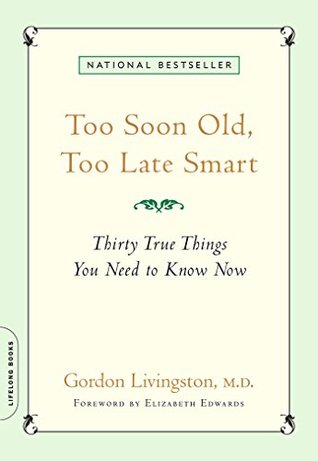More on this book
Community
Kindle Notes & Highlights
Read between
January 17 - January 24, 2021
Happiness is not simply the absence of despair. It is an affirmative state in which our lives have both meaning and pleasure.
Many of us are afraid of risk and prefer the bland, the predictable, and the repetitive. This explains the overwhelming sense of boredom that is a defining characteristic of our age.
The three components of happiness are something to do, someone to love, and something to look forward to.
If we have useful work, sustaining relationships, and the promise of pleasure, it is hard to be unhappy.
It is a tribute to the diversity of human life that people can find pleasure and meaning in pursuing mediocrity on the golf course or at the bridge table.
The worst deceptions, of course, are those we practice on ourselves.
If most of our behavior is driven by our feelings, however unclear they may be, it follows that to change ourselves we must be able to identify our emotional needs and find ways of satisfying them that do not offend those upon whom our happiness depends.
By accepting life and nurturance a child apparently incurs a debt that can be repaid only by meeting parental expectations.
We are trained to expect quick solutions. Feeling bad? Take this. The idea that we have to sit and talk about the problems we face and the things we have tried that have failed implies a slow and unwieldy process that has at its core an uncomfortable assumption: We are responsible for most of what happens to us.
Something is lost in our obsessive concern with safety and security—some spirit of adventure.
To take the risks necessary to achieve this goal is an act of courage. To refuse to take them, to protect our hearts against all loss, is an act of despair.
Practically any human characteristic—competitiveness, orderliness, even kindness—when indulged to an extreme can produce undesirable results.
The list of paradoxes is endless: the relentless pursuit of pleasure brings pain; the greatest risk is not taking any.
Our culture presents us constantly with stories of people who rose from obscurity to fame, often with limited talent. Rather than take hope from these stories, most people absorb them as additional indications of their own inadequacy.
The marketing of medications that favorably affect our mood, changing our appearance through plastic surgery, and self-improvement through consumption all play into the fantasy that happiness is for sale.
People mistake thoughts, wishes, and intentions for actual change.
Confession may indeed be good for the soul, but unless it is accompanied by altered behavior, it remains only words in the air.
We simply pay too much attention to words—ours and others’—and not enough to the actions that really define us.
Whatever other obligations we have to our children, a conviction that we can achieve happiness amid the losses and uncertainties that life contains is the greatest gift that can pass from one generation to the next.
In a society based on consumption, the concept of instant gratification is pervasive. Advertising presents us constantly with images that suggest that happiness can be ours through ownership of material goods.
This modern pursuit of the fountain of youth bespeaks a lack of acceptance of our common fate. There is a desperate, superficial quality in trying to eliminate the gradual evidence of our mortality.
If we feel gradually devalued by becoming older, then our lives become a discouraging process marked by desperate attempts to look and act younger while we disregard the compensations of knowledge and perspective that should result from our accumulated experience.
As long as we measure others and ourselves by what we have and how we look, life is inevitably a discouraging experience, characterized by greed, envy, and a desire to be someone else.
There is nothing more pointless, or common, than doing the same things and expecting different results.


